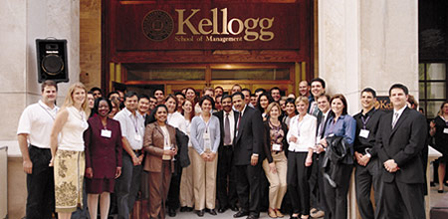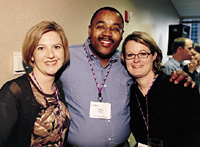|
|
 |
© Nathan Mandell
Dean Dipak Jain and TMP Associate Dean Vennie Lyons
(center) with students, faculty and staff at a recent
TMP class gift ceremony where students unveiled new
signage for the part-time program. |
Part-time students, full-time experience
The
Kellogg School evening management program offers the same top-quality
academics — and community — found in the school’s
traditional MBA curriculum, but with schedules designed to meet
the needs of working professionals
By Mary E. Morrison
When part-time MBA students from the Class
of 2001 first walked into 340 E. Superior St. on the Kellogg
School’s Chicago campus, they were greeted by an unceremonious
plastic banner bearing the school’s name. This spring,
at the part-time program’s first-ever class gift gala,
the recent graduates adorned the building with elegant new
signage, and began what many hope will be a longstanding tradition
at The Managers’ Program
(TMP).
The May 10 event, a Cajun-themed party, was
a celebration that recognized TMP’s Class of 2001, which
raised a record $61,000 for its class gift, and to inspire
the Class of 2002, which is determined to raise a six-figure
amount for its legacy. The evening began with a ceremony to
unveil the Class of 2001’s gift — a Kellogg sign
for the Superior Street entrance of the TMP building.
“There is a genuine sense of belonging,
a sense of community here,” Kellogg School Dean Dipak
Jain said to a large group of students, faculty, staff and
alumni gathered for the unveiling. “All of us, by working
together and employing our talents and passion, can take this
school to the next level and make it the best program in the
country.”
But it is not just a sense of community that
has landed TMP at No. 2 on the U.S. News & World Report
ranking of part-time MBA programs. The Kellogg School administration
has gone to great lengths — and has vowed to go even
further — to make sure that part-time students have
a full-time academic experience.
The key to achieving that goal, says Vennie
Lyons, associate dean and director of the part-time program,
is ensuring that TMP admits the same caliber students as the
full-time program and places the same faculty members at the
head of the evening classes.
Professor Sonia Marciano teaches management
and strategy in both the full-time and part-time programs
and points out that although many TMP students have demanding
work schedules, they still show up to class prepared. “This
dedication is very motivating for me as a professor,”
says Marciano. “Consequently, I can deliver that same
rigorous full-time course to the TMP students, without altering
my syllabus, even though we have somewhat less time relative
to the full-time curriculum.”
| |
 |
| |
© Nathan Mandell
TMP embraces the dynamic Kellogg culture. Here (left
to right) Keri Piercy, and William and Heather Kelley
enjoy a recent social event on the Chicago campus.
|
| |
|
Kellogg’s
thought leaders also give special lectures to TMP students,
Lyons notes, citing recent presentations by Dean Jain and Louis
Stern, the John D. Gray Distinguished Professor Emeritus of
Marketing, to smaller groups of part-time students. Beyond that,
Lyons says, it is important to offer TMP students the same special
programs for which Kellogg’s full-time program is known.
Among those programs are the Global Initiatives
in Management course (GIM), and TechVenture. For GIM classes,
students study a particular country for 10 weeks and then
travel to that country with a faculty adviser for two weeks
of intensive field work. TechVenture is a class in which students
study technology and innovation before meeting with leading
companies in Silicon Valley or other locales.
“Originally it was thought that TMP
students couldn’t participate in these academic opportunities
because they would have to miss work,” explains Lyons.
But, in fact, both programs have proven very
popular with students. TMP offers three or four GIM classes
a year, and when TechVenture was first introduced, one class
had as many as 550 students. “They find a way to make
it fit,” Lyons says. “Our students want to get
the whole experience.”
Of course, doing so isn’t easy. TMP
students juggle full-time jobs, class assignments and extracurricular
activities — not to mention their personal lives. It
can be challenging for these students to keep their day-in,
day-out focus on Kellogg, says Megan Byrne Krueger, assistant
dean and director of student affairs at the part-time program.
“We want people to get more than just a classroom experience,”
says Krueger, herself a 1990 TMP graduate. “Not everyone
will take advantage of that, but we want them to have the
opportunity and choice.”
Many students say they were drawn to the part-time
program because the class material would be directly applicable
to their daytime job. The key to success, they say, often
lies in time management.
“You end up having a set amount of time
to do your projects and to do your homework,” says Stephen
Simsic, who works in commercial real estate at U.S. Equities
Realty LLC and serves as president of the Evening Management
Association, TMP’s student government. “You have
constant deadlines, and hours matter. You’re pressed
for time.”
Apparently the sacrifice of time, and money,
is one that TMP students are willing to make for the academic
excellence delivered by Kellogg. The Class of 2001 raised
the largest financial contribution ever recorded by a TMP
class. More notable, says Liz Livingston Howard, director
of development and a 1993 graduate of the part-time program,
is that 48 percent of the class donated money to the class
gift fund. “It’s phenomenal,” Howard notes.
“To us, this participation is as important, if not more
important, than the amount of money raised because it indicates
a singular level of support.”
It’s a standard that the Class of 2002
intends to exceed. In announcing his class’s gift to
the school — a replica of the iconic stained glass window
that adorns the Jacobs Center in Evanston — Simsic threw
down the gauntlet to declare the goal of his Kellogg peers:
a 100 percent participation rate.
|
|
|



